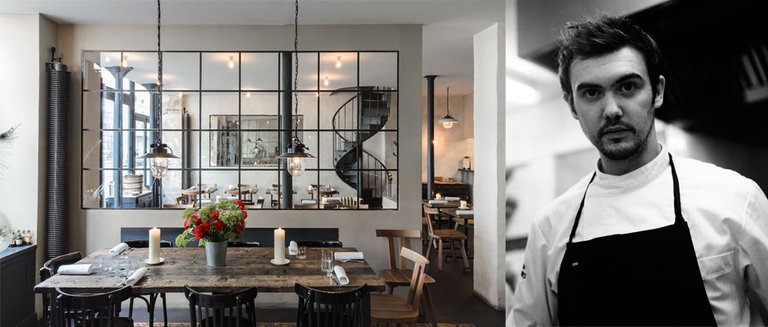
Bertrand Grébaut and Théo Pourriat are on a mission: not just to run the most sustainable restaurant on the planet, but to make sure it is sustainable in every way, from the wine they serve and the veg-centric menu to the fair treatment of every single person along the food chain. So far, they’re well on their way to achieving that goal, with Septime winning this year’s Sustainable Restaurant Award, sponsored by Silestone.
For the two old school friends sustainability isn’t just about the sourcing of ingredients. For them, it encompasses everything from protecting the environment to preserving historical techniques and creating harmony throughout the entire system. In practice, they have created a restaurant that has wowed critics – it rises this year to No.35 in The World’s 50 Best Restaurants – while being ethically sound.
Chef Grébaut has created a menu that is 80% vegetables, proudly showcasing the very best of French produce and producers. Everything they serve is grown in France, apart from coffee, sugar, vanilla and sometimes certain citrus fruits, like the oranges they source from Sicily. And for every product, Grébaut can name the farmer, fisherman, beekeeper, brewer or breeder who brought it to the restaurant.
Septime’s approach to meat is strictly sustainable. There is no beef because Grébaut and business partner Pourriat found it hard to find the meat produced to good standards in a country that’s more focused towards dairy-producing cows. When lamb is served, it comes from Mont Saint-Michel, and pork is sourced from three natural farms that raise native and local breeds including the Basque Kintoa pig, the black Bigorre and the White Western.
Wine is another product that’s treated seriously – every bottle is natural and there’s a firm anti-pesticide policy. Pourriat and Grébaut are converting their own 2.5-acre vineyard in Saint Emilion to biodynamic production, and currently most wine served in the restaurant is delivered by barge from the Rhone to Paris. Free-range native chicken is slaughtered after 150 days – three times longer than in their neighbouring UK – and it’s a given that the chef makes use of the whole animal in his cooking.
When they opened Septime in 2011, the two owners had a goal to celebrate vegetable-centric, no-frills gastronomy while still respecting the foundations in French classicism. With dishes like roasted endive, black truffle and black pudding or roasted cauliflower with pickled pears, bottarga and seaweed butter, they’re well on their way to finding a balance between fine French food and sustainability.
Hi! I am a robot. I just upvoted you! I found similar content that readers might be interested in:
http://www.theworlds50best.com/awards/sustainable-restaurant-award